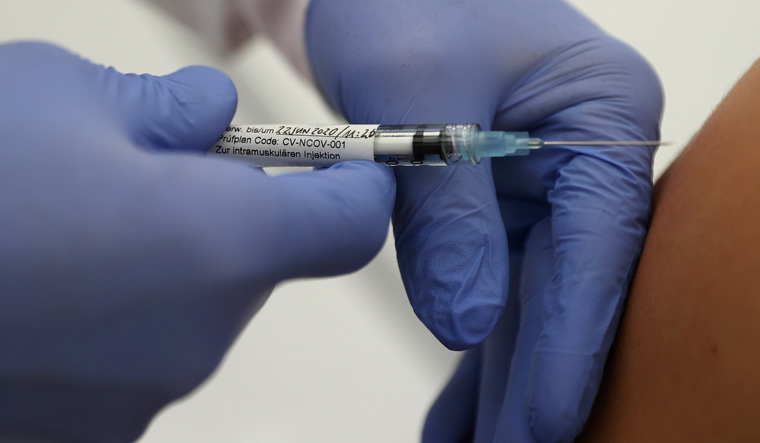The United Kingdom, on Thursday, announced that it will conduct ‘human challenge trials’ of the coronavirus, where volunteers will be deliberately infected with the novel coronavirus to test whether a vaccine offers any protection. Participants will be injected with an unnamed experimental vaccine and, around a month later, exposed to Sars-Cov-2, the virus that causes COVID-19, The Financial Times reported. The government-funded study is expected to begin in January, with the trials likely to take place in a large secure facility in Whitechapel in east London. Around 2,000 potential volunteers have signed up for challenge studies in the UK through the US-based group 1Day Sooner, which is campaigning for human challenge COVID-19 trials, according to the publication.
The Oxford University is also believed to be considering a similar "challenge trial" to test whether people have protective immunity from COVID-19 if they have been previously infected.
How does it work?
These experiments have parallels in history. In the 18th century, physician Edward Jenner injected an eight-year-old boy, apocryphally the son of his gardener, with cowpox virus to study the effects of smallpox on him.
In the current human challenge trials, according to the FT report, scientists will select and purify a strain of the virus that is genetically representative of that currently circulating in the population, and choose doses to infect volunteers without overloading their immune system—aka the “challenge dose”.
In case treatment is needed for the volunteers, drugs like remdesivir, dexamethasone and hydrocortisone will be used.
What is the importance of human challenge trials?
Vaccine testing is a four-stage process—pre-clinical testing on animals; Phase I clinical testing on a small group of people to determine its safety and to learn more about the immune response it provokes; Phase II trials, or expanded safety trials, where dosage and frequency will be tested across wider cross-sections of the population; Phase III large-scale tests where the vaccine is administered to thousands of people to confirm its efficacy. Phase I and Phase II are the early trials, which will then be followed by a rigorous, intensive Phase III clinical testing, where the longevity of the vaccine response (whether the vaccine will last for long periods of time) will be analysed.
The final Phase III trials can become cumbersome, especially in crunch situations when time is of the utmost essence. In the Journal of Infectious Diseases, authors Nir Eyal, Marc Lipsitch, and Peter G. Smith argued for human challenge trials replacing Phase III trials. “Challenging volunteers with this live virus risks inducing severe disease and possibly even death. However, accelerated vaccine evaluation could reduce the global burden of coronavirus-related mortality and morbidity,” they wrote.
In traditional Phase III trials, participants receive the vaccine candidate or a placebo/active comparator, and efficacy is judged by comparing the prevalence of infection in the vaccine group and the placebo/comparator group, to test the hypothesis that significantly fewer participants in the vaccine group get infected, as the lobby group 1Day Sooner explains.
The issue is that, after receiving a vaccine candidate, participants return to their normal daily lives to test the treatment under real world conditions which can be very slow to manifest. “Only a small proportion of these participants may encounter the disease, it may take a large number of participants and a many months for these trials to reveal differences between the vaccine and placebo groups. Phase III trials can be both complex and slow,” according to the group.
That is where the human challenge trials come in, lending scientists the “ability to observe participants closely and gather samples while tracing the progress of infection in real time, knowing exactly when they were infected and with what dose, and being able to follow up over a long period, would offer an unprecedented level of scientific and medical insight”.
Pushback against human challenge trials
Writing in medical journal Stat News, Michael Rosenblatt criticised the “well-intentioned” but flawed campaigns for human challenge trials. “Those in favor of human challenge trials propose enrolling as subjects only healthy young adults, since the COVID-19 mortality rate in this group is low. Yet the example of fatal infections in health care workers in the prime of life makes clear that even healthy non-elderly adults may succumb to the novel coronavirus.”
The author also argued that no volunteer will be able to give informed consent for the COVID-19 human challenge, because the true extent of the virus complications are still unknown. “COVID-19 was initially thought to be mainly a respiratory ailment. We now know that it can damage the kidneys, circulatory system, and the heart. It was initially believed that children could not be sickened by SARS-CoV-2, but it now appears that dozens have developed a severe inflammatory syndrome. And we know nothing about potential long-term complications of COVID-19 because the disease has only been in humans for months.”
The WHO has laid out the ethical regulations for human challenge trials. “[It is necessary for] Healthy and informed adults to consent to volunteer and participate in a human challenge trial whether they will receive an investigational vaccine that may or may not protect them from the challenge organism, a placebo that will not protect them, or only the challenge organism itself. However, accepting such risks requires absolutely that the elements of voluntary consent are based on truly being informed.”


